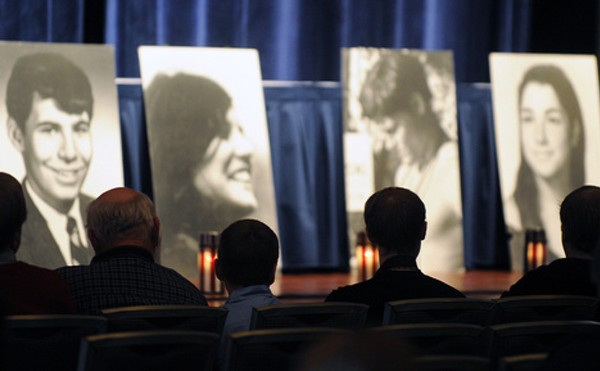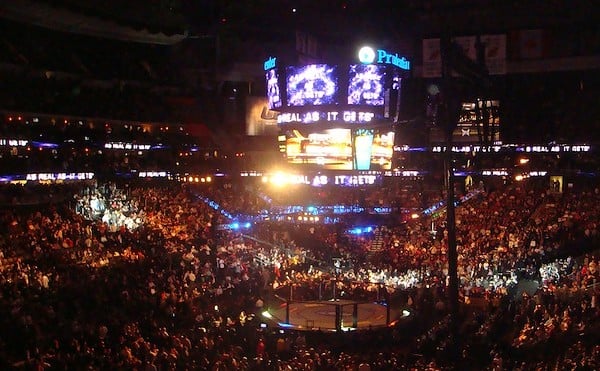Wow, my baby is a teenager, and like the typical teenager, LEO is no longer under my control, literally or figuratively. That is not all bad.
Raising a child or a newspaper is an exhausting job. Inevitably, you realize you’ve not only run out of energy, but new ideas as well. As many longtime readers know, I spent much of the last 15 years raising both LEO and Aaron, my real son. Coincidentally, I turned loose of LEO just about the same time Aaron went away to college. Neither was as traumatic as I had feared, and in most every way, both Aaron and LEO are better off.
When I founded LEO in 1990, I answered the question of what I envisioned for the new venture this way: “I don’t know what I ultimately want LEO to be. I don’t want to own it or run it forever. I hope it survives and that some day I will be proud to say that it was my idea.” So you see, for me, LEO has been an unqualified success.
A silly aside that will illustrate: In the movie “Elizabethtown,” Kirsten Dunst and Orlando Bloom are walking down East Market Street and pass one of the unmistakable LEO distribution boxes. The logo is prominently displayed, and I experienced one of the biggest surges of pride I can remember. It was sort of like the feeling I suppose a parent would have if their child sang the national anthem at the Super Bowl. That’s what I mean.
Today, people regularly ask me how things are going at the paper, and whether I miss running the show. Inwardly I laugh at that question, because it is funny on a number of levels. First, I never really “ran” LEO. I brought in people whose talents I respected and let them do their thing. For most of my 13 years of ownership, I compared my role to the outer wall at a NASCAR track; I was there to keep the drivers from running off the track and hurting somebody, but not to operate the accelerator or steer the car. Thus I could not miss something I never did. And I certainly do not miss the power, which, unless you’re President Bush, brings along a lot of tiresome elements like responsibility and accountability.
As for how things are going here at LEO, I can only say that insofar as LEO’s future is concerned, it appears to be more secure than it would have been if Blanche Kitchen and I still owned it. (I say “appears” because I don’t see the checkbooks any more, although current management is more forthright with this kind of information than we were.)
OK, those answers are out of the way, and now I will get to the heart of the matter, which is how the 15-year-old LEO compares with the publication I started, and how I feel about what it is today.
Genesis
Five years ago I penned a Tenth Anniversary review titled “The History of the World (since 1990).” It began this way: “In the beginning, darkness was upon the waters of the Ohio. The shadow of Gannett had shut out the light, and the people wandered aimlessly in search of truth. And I said, ‘Let there be light,’ and there was LEO.” That reflected my initial vision for LEO: an irreverent, iconoclastic, entertaining look at the “world” of Louisville.
In those early years, we were indiscriminate satirists, aiming our verbal spears and arrows at the likes of Jerry Abramson, Rick Pitino, Bush 41, Bill Clinton, Kentucky Gov. Wallace Wilkinson and Saddam Hussein. Most of it was good-natured fun — think “The Daily Show” in print — but we did not spare the venom when we thought it was appropriate, as it usually was when Wilkinson was involved. We did silly and pointless things, like fake a cover photo of then-U of L president Don Swain in a Carmen Miranda fruit headdress on the occasion of the football Cardinals’ trip to the Fiesta Bowl. In short, we had fun first and hoped the readers would join in.
LEO is not nearly as much fun as it used to be. I regret that, but we had stopped being really funny (or at least stopped trying) long before the new owners took over. Maybe the world just isn’t very funny these days, but I miss the satirical spirit that showed, at least in the early years, we didn’t take ourselves very seriously.
Journalistic genetics
LEO is now an established member of the Association of Alternative Newsweeklies, the trade association for more than 125 free weeklies across the country. All of us can trace our lineage to the Village Voice and Rolling Stone, publications that evolved — or maybe were just intelligently designed — from the “underground press” of the early 1960s. These were fliers, pamphlets and other publications that crusaded for Civil Rights or against the Vietnam War.
Produced mainly on college campuses by young Americans, they were highly opinionated screeds that mirrored the roiling emotions of the times. As they developed loyal audiences, they began to write about their own culture, which disproportionately involved rock ’n’ roll and illegal drugs.
To the extent that LEO, at the beginning, was a reflection of my own interests, it was dedicated largely to the discussion of public affairs. It was only when we realized that most of our likely advertisers were in the entertainment business that we began to devote more attention and space to music, the arts, food and other topics that would help pay the bills.
Like many (if not most) alternative weeklies, today’s LEO has flipped its emphasis toward entertainment. Now, I love music and movies and theater and food as much as the next person, but I must confess that LEO is not as interesting to me now as it once was. Then again, I’m old enough to be a grandfather, so my interests really don’t much matter. My son Aaron’s interests matter, and while he follows the news more than most of his generation, he and his friends are the ones filling Fourth Street Live and spending money with LEO’s advertisers. That, my friends, is reality, and another reason why it is better that LEO is in the hands of others.
Still, LEO is in a position to make important contributions to serious journalism in our community, and I hope its leaders will not lose sight of the paper’s potential for making a difference in the community.
Paper and ink (journalism lingo for nuts and bolts)
I have always been a word person, perhaps because I could not draw my way out of a paper bag. Consequently, I never worried very much about how LEO looked. As most of the past designers of the paper would tell you, I almost always deferred to them on design-related questions.
Upon assuming control of LEO in the summer of 2003, the new owners quickly redesigned the publication. Since then they also have changed the size of the paper, increased the design staff and switched printers so as to facilitate the addition of more color. Thank goodness. LEO looks better than ever.
The new owners have made substantial image-related investments, like our distinctive distribution street boxes. This has been extremely important in light of the addition of Velocity and other free-circulation publications to the market in the past few years. Candidly speaking, I doubt the past owners would have been willing to make those investments. After all, we felt we had earned the right to be the preeminent free weekly in Louisville. All others were impostors. Unfortunately, the world doesn’t work that way — remember AT&T? — and LEO’s owners have responded aggressively and effectively to the new competitive environment.
LEO’s role and the future
Journalistic ventures do not exist in a vacuum. The world around them changes, as does the journalistic environment. So when Velocity, backed by the substantial resources of Gannett and The Courier-Journal, entered the market, LEO’s dominance of entertainment-related advertising was challenged. It would have been suicidal for LEO to reduce its editorial emphasis on the local music scene in favor of more investigative reporting or more thought-provoking columnists.
Still, in order to prosper, any publication needs to make itself important, if not vital, to a significant base of readers. Over the years, LEO has done this in several ways. First, we always treated readers as though they had a personal stake in the publication. We printed their long letters. We addressed them personally. We helped them find love and less in our early personal ads. We showed we respected them by trusting their intelligence and strived to never wrote down to them. When we could, we covered subjects no one else did. We wrote about oral sex among teenagers, about the local communist party and about Dillard’s unfortunate tradition — thankfully now corrected — of racial discrimination. We were a place to go when the daily paper wouldn’t listen. We probably never did enough of those stories, but LEO seems to do even fewer now. I know current management wants to do more, and I hope as the paper’s resources increase, their journalistic courage and determination grow proportionately.
Perhaps LEO’s most useful role has been as a regular critic of local media, including itself. Over the years, Ed Woodward (a pseudonym) and then Tom Peterson performed this role with great distinction. Tom is phasing out of his role, but LEO must not. It is one way for LEO to guarantee a continuing utility beyond providing a listing of local band performances.
Regrets
Like Sinatra sang, Regrets, I’ve had a few, but then again, too few to mention. But mention them I will.
From LEO’s first day, I wanted to publish a local gossip/insider column that included social, political, business and sports tidbits. I still believe it would attract readers like nothing else. It would, for instance, spread rumors about what office Jack Conway was planning to seek, which local news team was marrying or divorcing, who was thinking about a major development project downtown and, well, the types of things Seedy K shares from the local sports world. I tried to find someone to do it. I really did. I regret I failed.
I regret we never won a Pulitzer when I was in charge, but there’s still time for LEO.
I regret I wrote that Bill Clinton was entitled to lie to the grand jury, even though I still believe the prosecutor had no right to ask him the questions he did.
I once regretted that my column was downsized to 800 words.
Now I don’t.
My only other regret is that I didn’t start LEO 25 years ago. I would have had so much fun lampooning Ronald Reagan.
Contact the writer at [email protected]





